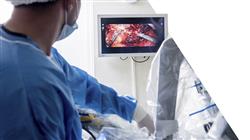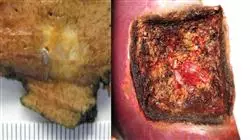University certificate
The world's largest faculty of medicine”
Introduction to the Program
Get updated on the most relevant diagnostic techniques, including genetic studies of the patient and molecular diagnostics”

The oncology field is possibly one of the areas with the greatest momentum in research work and continued developments. The implementation of new technologies in the surgical field, as well as the expanded use of Big Data and artificial intelligence in the assistance of both surgeons and researchers, has led to a favorable situation for all specialists in the area.
This being the case, updating processes are a sine qua non condition to be up to date, especially in a context of continuous advances. This program is presented as a preferential academic option to achieve this goal of updating, delving into advanced techniques and tools to investigate and diagnose tumors in the human body, as well as to implement effective treatments to combat cancer surgically.
Likewise, the Postgraduate Diploma has an eminently practical vision, provided by a teaching staff of advanced experts in surgical oncology. Throughout the course, the most relevant practical skills in oncological surgery research will be reviewed, while developing an in-depth understanding of the biology of cancer and the mechanisms that cause its growth and spread.
All this in a program free of face-to-face classes and preset schedules, giving the specialists absolute freedom to assume the teaching load at their own pace.
The didactic content is available in its entirety in the Virtual Campus, and can be downloaded from any device with an Internet connection to be subsequently reviewed from the tablet, smartphone or computer of choice.
Get up to date in everything related to Radiation Oncology and anatomopathological diagnosis in the field of Oncological Surgery”
This Postgraduate diploma in Diagnosis and Research in Oncological Surgery contains the most complete and up-to-date scientific program on the market. The most important features include:
- The development of practical cases presented by experts in Digestive Surgery and Oncology
- Graphic, schematic, and practical contents with which they are created, provide scientific and practical information on the disciplines that are essential for professional practice
- Practical exercises where the self-assessment process can be carried out to improve learning
- Its special emphasis on innovative methodologies
- Theoretical lessons, questions to the expert, debate forums on controversial topics, and individual reflection work
- Content that is accessible from any fixed or portable device with an Internet connection
You will be able to delve into the most important diagnostic and research fundamentals in Oncologic Surgery through a good variety of practical cases”
The program’s teaching staff includes professionals from the sector who contribute their work experience to this educational program, as well as renowned specialists from leading societies and prestigious universities.
Its multimedia content, developed with the latest educational technology, will provide the professionals with situated and contextual learning, i.e., a simulated environment that will provide an immersive education programmed to learn in real situations.
The design of this program focuses on Problem-Based Learning, by means of which the professionals must try to solve the different professional practice situations that are presented throughout the academic course. For this purpose, the students will be assisted by an innovative interactive video system created by renowned experts.
Choose when, where and how to take the course load, having total freedom to adapt the program to your own pace"

Access a Virtual Campus full of high quality multimedia resources, developed by teachers with vast experience in the field"
Why study at TECH?
TECH is the world’s largest online university. With an impressive catalog of more than 14,000 university programs available in 11 languages, it is positioned as a leader in employability, with a 99% job placement rate. In addition, it relies on an enormous faculty of more than 6,000 professors of the highest international renown.

Study at the world's largest online university and guarantee your professional success. The future starts at TECH”
The world’s best online university according to FORBES
The prestigious Forbes magazine, specialized in business and finance, has highlighted TECH as “the world's best online university” This is what they have recently stated in an article in their digital edition in which they echo the success story of this institution, “thanks to the academic offer it provides, the selection of its teaching staff, and an innovative learning method aimed at educating the professionals of the future”
A revolutionary study method, a cutting-edge faculty and a practical focus: the key to TECH's success.
The most complete study plans on the university scene
TECH offers the most complete study plans on the university scene, with syllabuses that cover fundamental concepts and, at the same time, the main scientific advances in their specific scientific areas. In addition, these programs are continuously being updated to guarantee students the academic vanguard and the most in-demand professional skills. In this way, the university's qualifications provide its graduates with a significant advantage to propel their careers to success.
TECH offers the most comprehensive and intensive study plans on the current university scene.
A world-class teaching staff
TECH's teaching staff is made up of more than 6,000 professors with the highest international recognition. Professors, researchers and top executives of multinational companies, including Isaiah Covington, performance coach of the Boston Celtics; Magda Romanska, principal investigator at Harvard MetaLAB; Ignacio Wistumba, chairman of the department of translational molecular pathology at MD Anderson Cancer Center; and D.W. Pine, creative director of TIME magazine, among others.
Internationally renowned experts, specialized in different branches of Health, Technology, Communication and Business, form part of the TECH faculty.
A unique learning method
TECH is the first university to use Relearning in all its programs. It is the best online learning methodology, accredited with international teaching quality certifications, provided by prestigious educational agencies. In addition, this disruptive educational model is complemented with the “Case Method”, thereby setting up a unique online teaching strategy. Innovative teaching resources are also implemented, including detailed videos, infographics and interactive summaries.
TECH combines Relearning and the Case Method in all its university programs to guarantee excellent theoretical and practical learning, studying whenever and wherever you want.
The world's largest online university
TECH is the world’s largest online university. We are the largest educational institution, with the best and widest online educational catalog, one hundred percent online and covering the vast majority of areas of knowledge. We offer a large selection of our own degrees and accredited online undergraduate and postgraduate degrees. In total, more than 14,000 university degrees, in eleven different languages, make us the largest educational largest in the world.
TECH has the world's most extensive catalog of academic and official programs, available in more than 11 languages.
Google Premier Partner
The American technology giant has awarded TECH the Google Google Premier Partner badge. This award, which is only available to 3% of the world's companies, highlights the efficient, flexible and tailored experience that this university provides to students. The recognition as a Google Premier Partner not only accredits the maximum rigor, performance and investment in TECH's digital infrastructures, but also places this university as one of the world's leading technology companies.
Google has positioned TECH in the top 3% of the world's most important technology companies by awarding it its Google Premier Partner badge.
The official online university of the NBA
TECH is the official online university of the NBA. Thanks to our agreement with the biggest league in basketball, we offer our students exclusive university programs, as well as a wide variety of educational resources focused on the business of the league and other areas of the sports industry. Each program is made up of a uniquely designed syllabus and features exceptional guest hosts: professionals with a distinguished sports background who will offer their expertise on the most relevant topics.
TECH has been selected by the NBA, the world's top basketball league, as its official online university.
The top-rated university by its students
Students have positioned TECH as the world's top-rated university on the main review websites, with a highest rating of 4.9 out of 5, obtained from more than 1,000 reviews. These results consolidate TECH as the benchmark university institution at an international level, reflecting the excellence and positive impact of its educational model.” reflecting the excellence and positive impact of its educational model.”
TECH is the world’s top-rated university by its students.
Leaders in employability
TECH has managed to become the leading university in employability. 99% of its students obtain jobs in the academic field they have studied, within one year of completing any of the university's programs. A similar number achieve immediate career enhancement. All this thanks to a study methodology that bases its effectiveness on the acquisition of practical skills, which are absolutely necessary for professional development.
99% of TECH graduates find a job within a year of completing their studies.
Postgraduate Diploma in Diagnosis and Research in Oncological Surgery
TECH's Postgraduate Diploma in Diagnostic and Research in Oncological Surgery academic program is an excellent opportunity for those interested in specializing in the field of oncological surgery. This program offers comprehensive and up-to-date training in diagnosis and investigation of oncologic diseases, with the objective of preparing health professionals in the management of advanced surgical techniques and in the early identification of cancerous diseases.
Study and get certified 100% online
During the development of the program, participants will have the opportunity to acquire theoretical and practical knowledge about the latest trends and advances in the field of oncological surgery. In addition, they will be provided with research tools and techniques that will enable them to carry out studies and projects in this field. The faculty is made up of outstanding professionals in the field of oncologic surgery, who have extensive experience in both the academic and clinical practice. In this way, participants will be guaranteed to receive quality preparation and will be in contact with the latest advances in oncological diagnosis and research. The entire program is taught 100% online, which facilitates access and study for professionals. At the end of the program, participants will receive a Postgraduate Diploma in Diagnostic and Research in Oncological Surgery. This program will allow them to access new job opportunities and will provide them with greater professional recognition. If you are interested in specializing in the field of oncologic surgery and wish to acquire updated tools and knowledge in diagnosis and research in this field, do not hesitate to enroll in the Postgraduate Diploma in Diagnosis and Research in Oncological Surgery program. Broaden your horizons and become an expert in this important and in-demand field in the healthcare field. Enroll now and start giving a boost to your professional career!







